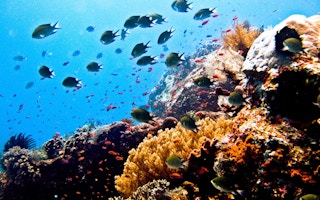Bali lies at the heart of the Pacific Coral Triangle, an area of the ocean that supports the greatest diversity of coral species in the world. The reefs around the Indonesian island provide food and shelter to more than 800 species of fish and a cornucopia of other creatures, from anemones, urchins and sea slugs, to octopus, crab and shrimp. This delicate balance of biodiversity in turn shores up the livelihoods, diets and identity of the island’s people.
But Bali’s coral reefs, like their counterparts the world over, face multiple stressors. In addition to the existential threat of climate change and coral bleaching, overfishing and destructive fishing, pollution, invasive species, and the effects of excessive dive tourism are taking their toll.
To halt the decline of coral reefs, local communities, NGOs and government agencies have initiated many projects throughout the island’s waters, ranging from designation of marine protected areas (MPAs), construction of artificial reefs, and implementation of coral rehabilitation and education programs. However, more needs to be done to safeguard these crucial coastal ecosystems, according to a recent review published in the Journal for Nature Conservation.
“
The most important thing to protect reefs worldwide is a global reduction in greenhouse gas emissions. This needs to happen to stop ocean warming and acidification, thus safeguarding corals from bleaching.
Zach Boakes, doctoral candidate, University of Bournemouth
The study highlights the need for community involvement to enhance compliance and locally-led enforcement of regulations, and the potential to link up Bali’s MPAs into a larger, interconnected network.
Zach Boakes, a doctoral candidate at the University of Bournemouth, and his colleagues reviewed the body of scientific and local literature investigating marine conservation issues in Bali. While they identified many examples of marine conservation best practices, they also found gaps in MPA management that continue to allow noncompliance with regulations.
“Stakeholder involvement has played a big part in the successes/failures of Bali’s MPAs, with the most successful MPAs being the ones that involve the community the most,” Boakes, who is also co-founder of Bali-based nonprofit North Bali Reef Conservation (NBRC), told Mongabay in an email. He added that some MPAs have failed to garner compliance from fishers due to authorities implementing a top-down method of management with little stakeholder involvement. As a result, destructive practices have continued.
“Now, more and more local-scale, [community-managed] MPAs are popping up across the island,” he said. “This is great because these projects involve the community in every step, and often are even enforced by the local people … Inevitably, these projects are more successful.”
Harnessing the power of communities is also a key driver of success in individual coral reef restoration initiatives. According to another review of more than 500 coral reef restoration projects in Indonesia over the past three decades, projects tend to fail due to inadequate long-term monitoring and evaluation. The authors found that community-led projects were far more likely to feature these crucial components and therefore lead to reef health improvements.
Boakes has firsthand experience of community-led action to address ecosystem degradation. Since 2016, he has worked with NBRC alongside community members in Tianyar, a small fishing village in northeast Bali, to restore a nearby reef that was destroyed by unsustainable fishing. To date, villagers and volunteers have installed roughly 8,500 artificial reef structures, resulting in an almost tenfold increase in marine biodiversity.
The authors recommend that marine resource managers work in a more coordinated way by collaborating across administrative regions to link up Bali’s three officially recognised MPAs — West Bali National Park, Pemutaran MPA and Nusa Penida Island — with the wealth of community-managed MPAs that exist in the island’s waters to create a large, highly connected network.
According to the authors, such a network would better protect large migratory and mobile animals like turtles, sharks and marine mammals and important commercial fishery species, while also enhancing opportunities to share best practices.
Boakes said progress is being made toward creating an MPA network off the northeast coast of the island: “It is my hope that these projects will be successfully established and will continue to be set up across other regions of the island.”
The authors also call on MPA managers to clearly mark zone boundaries in marine parks using buoys, beach signs, or through regular public meetings. Clearer delineation of zonation would boost compliance, they say, by making stakeholders, such as fishers, more aware of restrictions and regulations.
Besides scaling up community-led reef conservation initiatives and improving MPA management, Boakes said education programs, continued restoration of degraded coral reefs, and better waste management could also contribute to improving the health of Bali’s coral reefs.
Nonetheless, these multiple localised actions have their limits, according to Boakes. “The most important thing to protect reefs worldwide is a global reduction in greenhouse gas emissions,” he said. “This needs to happen to stop ocean warming and acidification, thus safeguarding corals from bleaching [which is] the number one threat to reefs across the globe.”
This story was published with permission from Mongabay.com.

















